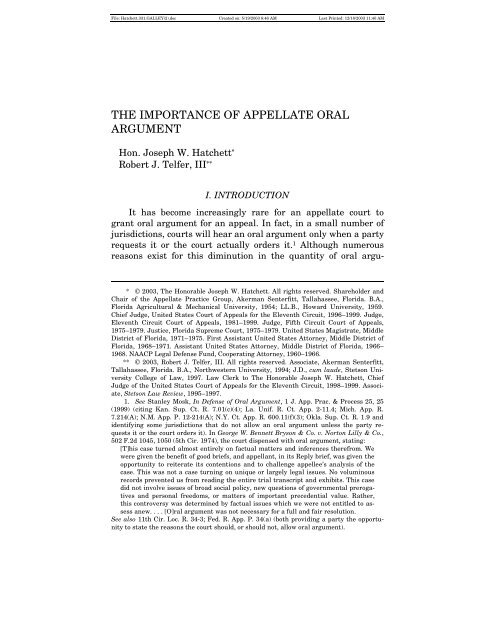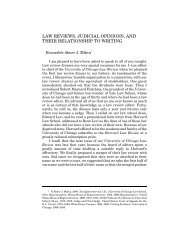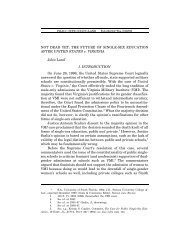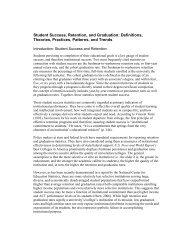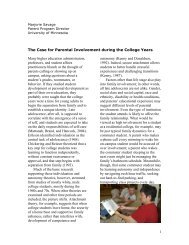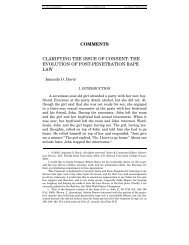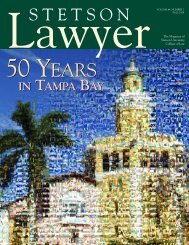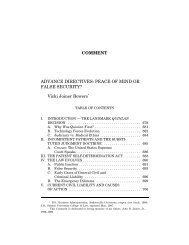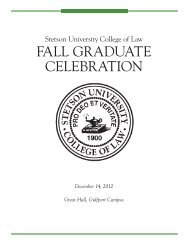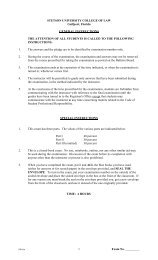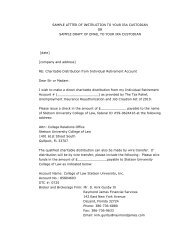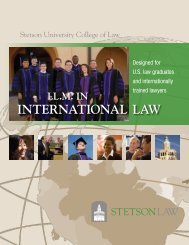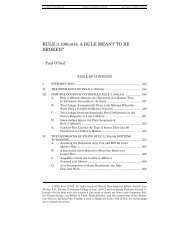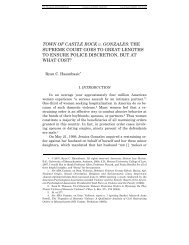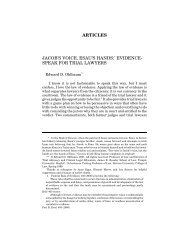THE IMPORTANCE OF APPELLATE ORAL ARGUMENT
THE IMPORTANCE OF APPELLATE ORAL ARGUMENT
THE IMPORTANCE OF APPELLATE ORAL ARGUMENT
You also want an ePaper? Increase the reach of your titles
YUMPU automatically turns print PDFs into web optimized ePapers that Google loves.
File: Hatchett.331.GALLEY(2).doc Created on: 5/19/2003 8:46 AM Last Printed: 12/18/2003 11:40 AM<strong>THE</strong> <strong>IMPORTANCE</strong> <strong>OF</strong> <strong>APPELLATE</strong> <strong>ORAL</strong><strong>ARGUMENT</strong>Hon. Joseph W. Hatchett *Robert J. Telfer, III **I. INTRODUCTIONIt has become increasingly rare for an appellate court togrant oral argument for an appeal. In fact, in a small number ofjurisdictions, courts will hear an oral argument only when a partyrequests it or the court actually orders it. 1 Although numerousreasons exist for this diminution in the quantity of oral argu-* © 2003, The Honorable Joseph W. Hatchett. All rights reserved. Shareholder andChair of the Appellate Practice Group, Akerman Senterfitt, Tallahassee, Florida. B.A.,Florida Agricultural & Mechanical University, 1954; LL.B., Howard University, 1959.Chief Judge, United States Court of Appeals for the Eleventh Circuit, 1996–1999. Judge,Eleventh Circuit Court of Appeals, 1981–1999. Judge, Fifth Circuit Court of Appeals,1975–1979. Justice, Florida Supreme Court, 1975–1979. United States Magistrate, MiddleDistrict of Florida, 1971–1975. First Assistant United States Attorney, Middle District ofFlorida, 1968–1971. Assistant United States Attorney, Middle District of Florida, 1966–1968. NAACP Legal Defense Fund, Cooperating Attorney, 1960–1966.** © 2003, Robert J. Telfer, III. All rights reserved. Associate, Akerman Senterfitt,Tallahassee, Florida. B.A., Northwestern University, 1994; J.D., cum laude, Stetson UniversityCollege of Law, 1997. Law Clerk to The Honorable Joseph W. Hatchett, ChiefJudge of the United States Court of Appeals for the Eleventh Circuit, 1998–1999. Associate,Stetson Law Review, 1995–1997.1. See Stanley Mosk, In Defense of Oral Argument, 1 J. App. Prac. & Process 25, 25(1999) (citing Kan. Sup. Ct. R. 7.01(c)(4); La. Unif. R. Ct. App. 2-11.4; Mich. App. R.7.214(A); N.M. App. P. 12-214(A); N.Y. Ct. App. R. 600.11(f)(3); Okla. Sup. Ct. R. 1.9 andidentifying some jurisdictions that do not allow an oral argument unless the party requestsit or the court orders it). In George W. Bennett Bryson & Co. v. Norton Lilly & Co.,502 F.2d 1045, 1050 (5th Cir. 1974), the court dispensed with oral argument, stating:[T]his case turned almost entirely on factual matters and inferences therefrom. Wewere given the benefit of good briefs, and appellant, in its Reply brief, was given theopportunity to reiterate its contentions and to challenge appellee’s analysis of thecase. This was not a case turning on unique or largely legal issues. No voluminousrecords prevented us from reading the entire trial transcript and exhibits. This casedid not involve issues of broad social policy, new questions of governmental prerogativesand personal freedoms, or matters of important precedential value. Rather,this controversy was determined by factual issues which we were not entitled to assessanew. . . . [O]ral argument was not necessary for a full and fair resolution.See also 11th Cir. Loc. R. 34-3; Fed. R. App. P. 34(a) (both providing a party the opportunityto state the reasons the court should, or should not, allow oral argument).
File: Hatchett.331.GALLEY(2).doc Created on: 5/19/2003 8:46 AM Last Printed: 12/18/2003 11:40 AM2003] Appellate Oral Argument 141change a judge’s mind at oral argument?” Although the answer tothis question differs with every judge, an appellant or appelleewho faces oral argument should approach his or her argumentwith the basic assumption that the answer to either question is“yes.” 7For example, in the 1980s, Judge Myron H. Bright of theUnited States Court of Appeals for the Eighth Circuit and two ofhis colleagues on the Eighth Circuit tracked the number of casesin which oral argument changed the judges’ minds. 8 In all of thesecases, the judges had reviewed the briefs before oral argumentand formed a tentative conclusion. 9 The judges then noted at theconclusion of oral argument whether their vote on the case at conferencewas consistent with the opinion they held before oral argument.10 The result was that Judge Bright changed his mindthirty-one percent of the time, with the other two colleagueschanging their minds seventeen and thirteen percent of the time,respectively. 11If oral argument can change a judge’s mind—thus influencingyour case—then the next question an appellate practitionershould ask is “How?” The obvious first response to this question isto be thoroughly prepared, which will be discussed in the nextsection. However, a not-so-obvious response could be “by acting asan invaluable resource at the judges’ preliminary conference.”In the typical progression of an appellate case, the judges—and their law clerks—read the briefs and review the issues andcited authorities. They may also review the record or record excerptsprovided to them. A judge then proceeds to oral argument,7. In commenting on the importance of oral argument, United States Supreme CourtJustice Robert H. Jackson stated, “I think the Justices would answer unanimously thatnow, as traditionally, they rely heavily on oral presentations. Most of them form at least atentative conclusion from it in a large percentage of the cases.” Robert H. Jackson, Advocacybefore the United States Supreme Court, 37 Cornell L.Q. 1, 2 (1951).8. Myron H. Bright, The Power of the Spoken Word: In Defense of Oral Argument, 72Iowa L. Rev. 35, 40 nn. 32–33 (1986).9. Id.10. Id.11. Id.; see Mosk, supra n. 1, at 25 n. 5 (citing Joel F. Dubina, From the Bench: EffectiveOral Advocacy, 20 Litig. 3, 3–4 (Winter 1994) (stating, “[I]n many cases, the helpfulnessof oral argument is overrated. It can, however, make the difference in a close case. . . .I have seen cases where good oral argument compensated for a poor brief and saved theday for that litigant. I have also seen effective oral argument preserve the winning of adeserving case.”). Joel F. Dubina is a judge on the United States Court of Appeals for theEleventh Circuit. Id.
File: Hatchett.331.GALLEY(2).doc Created on: 5/19/2003 8:46 AM Last Printed: 12/18/2003 11:40 AM142 Stetson Law Review [Vol. XXXIIIand soon thereafter, conferences with the other judges on thepanel to reach a tentative decision. It is at this conference thatthe judges share their views on the case, including their understandingof the facts and law.A great way to approach an oral argument is to think of it asthe preliminary conference for deciding the case. Oral argumentis the first time that all judges on the panel meet to consider aparticular matter. As Supreme Court Justice Byron R. White remarked,All of us on the bench [are] working on the case, trying todecide it. . . . They think we are there just to learn about thecase. Well, we are learning, but we are trying to decide it,too. [12] [I]t is then that all of the Justices are working on thecase together, having read the briefs and anticipating thatthey will have to vote very soon, and attempting to clarifytheir own thinking and perhaps that of their colleagues.Consequently, we treat lawyers as a resource rather than asorators who should be heard out according to their own desires.13Supreme Court Justice Antonin Scalia, when interviewed,also intimated that oral argument is an opportunity for a lawyerto participate in a preliminary conference of the case:It isn’t just an interchange between counsel and each of theindividual Justices. What is going on is also to some extentan exchange of information among the Justices themselves.You hear the questions of the others and see how theirminds are working, and that stimulates your own thinking. Iuse it, he added, to give counsel his or her best shot at meetingmy major difficulty with that side of the case. “Here’swhat’s preventing me from going along with you. If you canexplain why that’s wrong, you have me.” 14Following the “oral argument as a preliminary conferencemodel,” an advocate at oral argument should attempt to engage ina conversation with the judges and be prepared to answer ques-12. Stephen M. Shapiro, Questions, Answers, and Prepared Remarks, 15 Litig. 33, 33(Spring 1989) (citing This Honorable Court (WETA 1988) (TV broadcast)).13. Id. (quoting Justice Byron R. White, The Work of the Supreme Court: A Nuts andBolts Description, N.Y. St. B.J. 346, 383 (Oct. 1982)).14. Id. (citing This Honorable Court (WETA 1988) (TV broadcast)).
File: Hatchett.331.GALLEY(2).doc Created on: 5/19/2003 8:46 AM Last Printed: 12/18/2003 11:40 AM2003] Appellate Oral Argument 143tions that the judge may have. 15 When oral argument is viewedthis way, its whole existence becomes an exercise in answeringthe judges’ questions, and clarifying their understanding of thelaw. A lawyer should maintain a tone of “respectful equality,” 16demonstrating in tone and demeanor that he or she is an intellectualpeer of the judges on the panel. 17 This tone and demeanorleaves little, if any, room for rhetoric or the “dramatic flourishthat we all dream of as advocates.” 18 Chief Justice William H.Rehnquist described the ideal oral advocate as the following:[S]he will realize that there is an element of drama in oralargument. . . . But she also realizes that her spoken lineshave substantive legal meaning. . . . She has a theme and aplan for her argument, but is quite willing to pause and listencarefully to questions. . . . She avoids table pounding andother hortatory mannerisms, but she realizes equally wellthat an oral argument on behalf of one’s client requires controlledenthusiasm and not an impression of fin de siecle ennui.19As this “invaluable source” to the appellate panel during preliminaryconference, a lawyer arguing the case should view himselfor herself as the expert on every facet of the case. Assumingthe panel asks questions, the judges will engage this expert in theSocratic method as they struggle with the issues involved. 20 On a“hot” bench, this expert will face a barrage of questions, some ofwhich may appear hostile. A hostile question, however, may rep-15. Wolff, supra n. 4, at 1100.16. Gary L. Sasso, Appellate Oral Argument, 20 Litig. 27, 30 (Summer 1994). Further,there are certain things that a lawyer should not do to maintain respectful equality. Id. Alawyer should never raise his or her voice, interrupt the judge, or show impatience. Id.17. Id.18. Wolff, supra n. 4, at 1102.19. Shapiro, supra n. 12, at 33 (quoting William H. Rehnquist, Oral Advocacy: A DisappearingArt, 35 Mercer L. Rev. 1015, 1024–1025 (1984)).20. Justice John M. Harlan stated:[T]he job of courts is not merely one of an umpire in disputes between litigants.Their job is to search out the truth, both as to the facts and the law, and that is ultimatelythe job of the lawyers, too. And in that joint effort, the oral argument givesan opportunity for interchange between court and counsel which the briefs do notgive. For my part, there is no substitute, even within the time limits afforded by thebusy calendars of modern appellate courts, for the Socratic method of procedure ingetting at the real heart of an issue and in finding out where the truth lies.John M. Harlan, What Part Does the Oral Argument Play in the Conduct of an Appeal? 41Cornell L.Q. 6, 7 (1955).
File: Hatchett.331.GALLEY(2).doc Created on: 5/19/2003 8:46 AM Last Printed: 12/18/2003 11:40 AM144 Stetson Law Review [Vol. XXXIIIresent a judge engaging in a game of “devil’s advocate” to resolvean issue that is troubling him or her. 21Another type of question an appellate advocate may receive isone that, while directed at the advocate, actually addresses a concernthat one member of the panel knows that another judge has.With this type of question, an effective appellate advocate shouldrecognize that the judges are talking to each other—like they doin conference—and should either reinforce favorable points or distinguishunfavorable points and attempt to turn them in his orher favor.The advocate should also recognize that he or she is attemptingto persuade the panel to rule in his or her favor. To accomplishthis, the advocate “must speak, look, and listen simultaneously.”22 The only way an advocate can determine, and thereforeattempt to affect, a judge’s view is by looking and listening. Bylooking at a judge’s body language, and listening to the questionshe or she asks, an effective appellate oral advocate should be ableto conform his or her argument to the judge’s viewpoint. Failingthis skill, an advocate is left to guess the judge’s view and is ineffectivein this preliminary conference.This skill is monumentally important for the appellee. Theappellee must listen to the appellant’s initial argument and watchthe judges’ reactions to these arguments, and must ascertain keypoints that the judges either are having trouble resolving or thatthe appellant has missed. The appellee must also recognize thedrama of the moment initially following the conclusion of the appellant’sinitial argument. As Justice Walter V. Schaefer of theIllinois Supreme Court stated,21. Advocates sometimes encounter a “cold” bench that does not ask many questions.Generally, members of a “cold” bench have either not read the briefs, or think very little ofthe case or the lawyer appearing before them. Obviously, this is not a good sign. As onecommentator stated:Rejoice when the court asks questions. Again, I say unto you, rejoice! If the questiondoes nothing more, it gives you assurance that the court is not comatose and thatyou have awakened at leas[t] a vestigial interest. Moreover, a question affords youyour only chance to penetrate the mind of the court, unless you are an expert in facereading, to dispel a doubt as soon as it arises.Hugh C. Griffin, Practice Tips: Preparing for Oral Argument, 17 Brief 54, 56 n. 3 (Fall1987) (quoting Nicholas M. Cripe, Fundamentals of Persuasive Oral Argument, 20 Forum342, 357 (1985)).22. Steven D. Merryday, Florida Appellate Practice: Oral Argument 17.1, 17.11 (4thed., Fla. B. 1998).
File: Hatchett.331.GALLEY(2).doc Created on: 5/19/2003 8:46 AM Last Printed: 12/18/2003 11:40 AM2003] Appellate Oral Argument 145To me one of the most dramatic moments in the trial of alaw suit comes when the appellee rises to make his reply. . . .For a half hour, under our rules, the appellant’s ideas, histheories, the theory of the case, have dominated the courtroom. He sits down and in that rather charged atmospherethe appellee rises . . . and as he starts out you are on theedge of your chair. You think, well now, this . . . is going tobe crucial; the case will turn on this and you listen eagerlyfor the first minute and the second and the third and nothinghappens and he is repeating the same facts, and thatman has lost the attention of the court which he had in ahighly sensitized degree when he began. He has lost it and itis even money that he will never get it back. Just what to dodepends upon the circumstances of the particular case, butthis much I know, in that opening moment you have tostrike for the jugular, you have to hit home. If there is somethingwrong with the statement of facts, by all means bringit out; if there is not, for heaven’s sake don’t just restatethem because you are lost if you do, and the court will be doingsomething else during the balance of the time you argue.23Finally, the court may ask a question that is intended to drawa concession from counsel. In this situation, counsel should beaware of a potential trap, but should also exercise complete candorto the tribunal. As Justice Robert H. Jackson stated,The successful advocate will recognize that there is someweakness in his case and will squarely and candidly meet it.If he lost in the court below and needs appellate relief, thatfact alone strongly suggests some defect in his position. If heis responding to a writ of certiorari, he should realize thatseveral Justices have been tentatively impressed that thejudgment below is dubious or in conflict with that of othercourts, otherwise certiorari would not have been granted.The petitioner should never dodge or delay but give priorityto answering the reasons why he lost below. The respondentshould ask himself what doubts probably brought the caseup and answer them. They will then be covering the questionsthat the Justices are waiting to hear answered. To de-23. Id. at 17.16 (quoting Walter V. Schaefer, Appellate Advocacy, 23 Tenn. L. Rev. 471,474 (1954)).
File: Hatchett.331.GALLEY(2).doc Created on: 5/19/2003 8:46 AM Last Printed: 12/18/2003 11:40 AM146 Stetson Law Review [Vol. XXXIIIlay meeting these issues is improvident; to attempt evasionof them is fatal. 24It is this type of questioning that the appellate practitionershould anticipate in preparing for oral argument, which will bediscussed in the next section.III. PREPARING FOR <strong>ORAL</strong> <strong>ARGUMENT</strong>As courts have restricted the number and length of appellateoral arguments, an attorney must recognize the remarkablesituation that he or she faces. Preparing for this event, therefore,is monumentally important. Although every experienced appellatepractitioner may have a unique method for preparing an oralargument, he or she should always base this preparation on twobenchmarks: thoroughness and flexibility.Before preparing for the oral argument, it must be decided“who” will argue the appeal. Oftentimes, trial counsel presentsthe oral argument on appeal. Appellate lawyers, who have experiencein oral arguments, may be better suited to handle an appealfrom the briefing stage through oral argument. Justice Jacksoncommented on the problems a trial counsel may encounter inhandling an appeal:Convincing presentations often are made by little-knownlawyers who have lived with the case through all courts.However, some lawyers, effective in trial work, are not temperamentallyadapted to less dramatic appellate work. Andsometimes the trial lawyer cannot forego bickering overpetty issues which are no longer relevant to aspects of thecase. . . . When the trial attorney lacks dispassionate judgmentas to what is important on appeal, a fresh and detachedmind is likely to be more effective. 25In Arabia v. Siedlecki, 26 a recent en banc decision of Florida’sFourth District Court of Appeal, Judge Gary M. Farmer, in hispartial concurrence and dissent, stated,My own experience in both roles suggests that most of thetime the trial lawyer is well-advised to bring in another law-24. Jackson, supra n. 7, at 5.25. Id. at 3.26. 789 So. 2d 380 (Fla. 4th Dist. App. 2001) (en banc).
File: Hatchett.331.GALLEY(2).doc Created on: 5/19/2003 8:46 AM Last Printed: 12/18/2003 11:40 AM2003] Appellate Oral Argument 147yer to handle the appeal. This is not because appellate law isso arcane that only the cognoscenti can handle it. It is reallybecause the lawyer who handled the trial is often unable todiscern the appellate forest from the trial trees. Issues thatconsumed the trial lawyer are often of marginal significanceat best on appeal; issues that seemed trivial during trialmay become critical on review. 27If trial counsel has the means to utilize an appellate lawyer,it is highly recommended that he or she do so, because of the substantialdifferences one encounters on appeal as compared totrial. However, only one attorney should make the argument; attorneysshould avoid “splitting” the argument. 28Once that decision is made, an important component for preparingfor bench questions is the tedious process of studying therecord below, as well as all briefs, cited authorities, legislativehistory, and any scholarly commentary. 29 This time-consumingreview will give the attorney arguing the case the opportunity tobegin selecting the important issues that need to be mentioned atoral argument. Most importantly, this initial review should allowthe attorney to become familiar enough with the appeal to answerany question that the appellate panel may have.After this thorough review, the attorney should become moreselective. That is, the attorney should determine the key issuesthat must be raised during questioning, making the argument as“simple” as possible for the bench. As Justice John M. Harlanstated,Most cases have one or only a few master issues. In planninghis oral argument the wise lawyer will ferret out and limithimself to the issues which are really controlling, and will27. Id. at 392 (Farmer, J., concurring in part and dissenting in part).28. Justice Jackson commented on this practice, stating:If my experiences at the bar and on the bench unite in dictating one imperative, it is:Never divide between two or more counsel the argument on behalf of a single interest.Sometimes conflicting interests are joined on one side and division is compelled,but otherwise it should not be risked. When two lawyers undertake to share a singlepresentation, their two arguments at best will be somewhat overlapping, repetitiousand incomplete and, at worst, contradictory, inconsistent and confusing.Jackson, supra n. 7, at 2.29. Shapiro, supra n. 12, at 35.
File: Hatchett.331.GALLEY(2).doc Created on: 5/19/2003 8:46 AM Last Printed: 12/18/2003 11:40 AM148 Stetson Law Review [Vol. XXXIIIleave the less important or subordinate issues to the court'sown study of the briefs. 30In selecting these issues, the attorney should resist the temptationto simply follow the layout of the issues in the brief. Oftentimes,after further review of the record and caselaw, it becomesapparent that the more favorable issues and arguments are notthe lead arguments in the brief. 31 All the while, however, the attorneyshould be preparing for questions on any of the issuesraised in the briefs.The next step an attorney should take in preparing a flexiblepresentation to the court is an attempt to anticipate the types ofquestions that the bench may ask. An advance “scouting” of questionswill help lay the intellectual groundwork for weaving togetherplanned remarks and responses to questions. This will alsohelp avoid awkward moments during oral argument, when counselmay lose his or her place after tough questioning from thebench. 32 One commentator suggested considering the following“common sense” concerns of the court in attempting to predictquestions from the bench:• What is the case about? (What holding do you want? Whatrule do you want the court to adopt to justify that holding?Is there any other rule that would satisfy you?)• How would your rule work? (What are the practical consequencesof the rule? How would it change current practices?Can it be administered?)30. Harlan, supra n. 20, at 8; see Sasso, supra n. 16, at 28 (stating that “[w]hicheverside you represent, you must tighten the focus even more when selecting points to be emphasizedin oral argument. You will not have time to say everything that could be saidabout even two or three grounds for appeal. You may not even have time to address suchgrounds adequately. Take your best shot; focus your time and attention on the pivotalpoint or points. Then tell the court that you will rest on your brief on the remaining points,and offer to answer questions on those issues.”).31. According to Sasso, an attorney should do the following:Resist the temptation to base the text and structure of oral argument on the contentsof your brief. It usually is unwise to organize your argument exactly the wayyou organized your brief. This is so because briefs and oral argument have differentfunctions and conventions. Writing and talking are different activities. What worksin one does not in the other.Sasso, supra, n. 16, at 28.32. Shapiro, supra n. 12, at 35.
File: Hatchett.331.GALLEY(2).doc Created on: 5/19/2003 8:46 AM Last Printed: 12/18/2003 11:40 AM2003] Appellate Oral Argument 149• What will the rule mean in future cases? (How far doesyour rule go? Where does it meet a limiting principle? Willlower courts have trouble applying it?)• Can the court do that? (Is there a legally respectable argumentfor the rule based on traditional principles of interpretation?Is it consistent with what the court has saidbefore? Does it conform to governing statutory or constitutionallanguage and history?)• Why should we do that? (What values and interests wouldbe advanced by adoption of the proposed rule? Would opposingvalues and interests be fairly accommodated?) 33Once the attorney has spent time anticipating the questionsthe bench may ask, it is time to prepare a flexible outline. Theoutline should begin with concise statements covering the followingareas: (1) the appellate posture of the case, (2) all of the issuesraised, and (3) the pertinent facts. Next, it should highlight themain issues that the attorney has selected after his or her thoroughreview of the appeal. The outline should contain bulletpoints or some other form of concise statement that the attorneyfeels must be mentioned at oral argument. If the attorney was tomake his or her presentation directly from these parts of the outline,the presentation should take approximately five minutes.The remainder of the outline may touch the remaining issues onappeal. The outline should be easy to read and reference. Theattorney should prepare the outline to fit on a single legal-sizepage. 34The attorney may also wish to consider using demonstrativeexhibits at oral argument. Exhibits are rarely used, and often detractfrom the argument. As an attorney has a limited amount oftime to present his or her argument, struggling with an exhibitonly lessens the time in which the attorney can have an impact onthe bench. However, particularly when arguing over the languagein a statute or contract, it may be helpful to have the language“blown up” for the bench to see. 3533. Id.34. See e.g. Griffin, supra n. 21, at 55 (stating that his favorite technique is to put keypoints on one legal-size page).35. Wolff, supra n. 4, at 1106. Judge Wolff commented on the use of exhibits:When you're in oral argument discussing a statutory provision, you might considerblowing up the language on a projector or a piece of foam board that you can put onan easel. But I must caution you: some of us have poor eyesight. I have seen, or more
File: Hatchett.331.GALLEY(2).doc Created on: 5/19/2003 8:46 AM Last Printed: 12/18/2003 11:40 AM150 Stetson Law Review [Vol. XXXIIINext, the attorney needs to rehearse the argument to improveits clarity and impact. A rehearsal will allow the attorney“to cut out fuzzy detail, long-winded explanations, lengthy quotations,and detailed case discussion,” while also providing “goodpractice in shifting smoothly between prepared comments andresponses to questions.” 36 Rehearsal also will give the attorneysome sense of how long it will take to make all the necessarypoints. Most attorneys will realize, after rehearing the argumenttwo or three times, that it must be trimmed down.The attorney may consider participating in a moot court,which can be tremendously helpful. Many attorneys argue to amoot court panel several times. First, the panel should hear theattorney's complete argument to assess its strength and clarity.Moot court members will see problems, including gestures or fidgeting,of which the attorney may not be aware. The discussionbetween the attorney and the moot court members should help indetermining the important issues for oral argument. Then, theattorney should rehearse the argument, with moot court panelinvolvement, without time limitation so that the attorney can respondto all questions that emerge and develop affirmative pointsduring those responses. Finally, the attorney should practice theargument within the time constraints of the actual argument.After the moot court session, the attorney may wish to refineand condense the oral argument outline. The moot court shouldoccur at least several days before the argument, to give the attorneytime to digest the suggestions of the moot court panel and torefine any arguments for the outline.IV. CONCLUSIONAs stated in the introduction to this Article, an appellateattorney who receives oral argument should treat the situationwith the importance that the appellate court has accorded it. Oralargument may be the most critical aspect of your appeal, and itaccurately not seen, quite a few exhibits with statutory language or contract provisionsblown up so that the advocate and the judges could examine the language together.The only problem was that at a bench long enough for seven judges, the printis rarely big enough for all of us to see. So you can either give us an individual copyor refer to your appendix, to follow along, or you can let us sit there and be annoyed.Id.36. Shapiro, supra n. 12, at 35.
File: Hatchett.331.GALLEY(2).doc Created on: 5/19/2003 8:46 AM Last Printed: 12/18/2003 11:40 AM2003] Appellate Oral Argument 151should be treated seriously. Justice Harlan eloquently summedup the importance of oral argument as follows:I should like to leave with you, particularly those of you whoare among the younger barristers, the thought that your oralargument on an appeal is perhaps the most effective weaponyou have got if you will give it the time and attention it deserves.Oral argument is exciting and will return rich dividendsif it is done well. And I think it will be a sorry day forthe American bar if the place of the oral argument in ourappellate courts is depreciated and oral advocacy becomeslooked upon as a pro forma exercise which, because of traditionor because of the insistence of his client, a lawyer has togo through. 3737. Harlan, supra n. 20, at 11.


